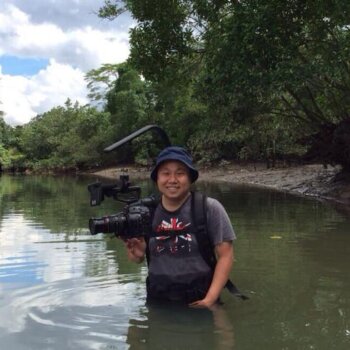Jia En is one of the founders of Roomorama.com, a leading platform for short-term accommodations worldwide. Her passion for travel, combined with the frustration at the lack of affordable, yet decent accommodation, led her to found Roomorama with her then boyfriend, now husband, Federico Folcia. Prior to Roomorama, Jia En worked at Bloomberg, in New York.
Today, The Asian Entrepreneur is joined by Jia En for an insightful interview about her experiences as an entrepreneur.
What exactly is Roomorama?
Roomorama is the largest platform for professionally-managed properties worldwide. Roomorama currently has more than 120,000 properties, in more than 5000 locations worldwide (and growing).
How did you come up with the idea of Roomorama?
Federico and I are avid travelers. Before we started Roomorama, we were in our mid 20s, tired of staying in faceless, cookie-cutter budget hotels and backpacker hostels, yet we weren’t quite able to afford swanky boutique hotels either. We looked around us and thought that there must be thousands of apartments sitting empty at any one point in time – how do we find them, how do we book them, and how do we convince the other party that we are legitimate and safe?
At the same time, whenever we traveled, we always rented out our place to travelers coming to NY via online classifieds like Craigslist. However, we never really knew who was on the other side of the transaction, we had to deal with no-shows, and we had no way of showcasing the positive feedback we received.
To solve all these problems, we started Roomorama – we wanted to create a platform that would make it very simple and safe for travelers to find and book a place to stay anywhere in the world, and for homeowners to be able to rent out their place in a hassle-free way.
Could you walk us through the process of starting up Roomorama?
Starting out was very difficult. First of all, because neither Federico nor I are technical, we had to find a company to help us build a website based on our wireframes that were initially all hand-drawn on paper!
The next challenge was to convince the first few hosts to sign up with us, with no history or track record to speak of. We went out and met every single one of the first few hosts, and visited their properties to make sure they were legitimate and of good quality. We then had to go out and find the people who would actually come to our site to find and book an apartment. I remember personally posting ads, handing out flyers in the cold, and actually calling all the leads that came to our site, and tried to make a sale happen.
While the concept was starting to gain traction in New York, we still had to convince people everywhere else, that staying in an apartment or home was actually a better idea than staying in a hotel. We did this through active engagement with the media, networking as much as we could, and just being advocates and ambassadors of this new trend of travel ourselves.
How has it been like managing the business since?
Things have changed a lot since we started. We have grown from a small concept to an actual company, with 45 employees worldwide, and thousands of people around the world using our product and service. At the same time, we always feel like we could be doing more – we never stop pushing ourselves to keep innovating and keep changing. There are plenty of ups and downs. We have small victories everyday, but also run into challenges and seeming failures as frequently.
Now, in addition to the problems we had to solve as a small company of two, we also have to manage many more people, and every day, we learn that that is probably the hardest thing to do.
Did you find anything particularly difficult during the startup? How did you overcome it?
Yes we definitely had some big difficulties. We were actually sued very early on by someone who wanted to join our team as a partner but who left after a few months. It was an unfair lawsuit, but we had no choice but to defend our case. This dragged on for the first two years of our existence, during which time we had to bootstrap and try to grow organically because we were not able to go out and raise money to scale fast. We overcame it by not letting the problem overwhelm and paralyze us – we every hurdle one step at a time, and tried to see the bigger picture and we stuck to what we really believed in.
Yes we definitely had some big difficulties. We were actually sued very early on by someone who wanted to join our team as a partner but who left after a few months. It was an unfair lawsuit, but we had no choice but to defend our case. This dragged on for the first two years of our existence, during which time we had to bootstrap and try to grow organically because we were not able to go out and raise money to scale fast. We overcame it by not letting the problem overwhelm and paralyze us – we every hurdle one step at a time, and tried to see the bigger picture and we stuck to what we really believed in.
It was not easy convincing everyone about the concept of staying in someone else’s property – there are many pre-conceived notions and cultural barriers that made it hard for everyone to buy into the idea immediately. However, we saw this as a necessary challenge to overcome – the point of every business is for the people running it to help others see the benefits of the product/service they are providing, and continue tweaking the product/service until people are willing to use it and pay for it.
Do you face a lot of competition in this industry? What is your strategy against your competition?
Yes, the travel industry is very competitive, and the short-term rental industry has certainly gotten more competitive since we started as well.
Roomorama’s focus is on the B2C space, meaning that we work mostly with professionally-managed properties. In fact, 80% of our properties are professionally-managed. By working with professionally-managed properties, we are able to assure higher quality and greater reliability for our customers.
Further, we want to “hotelify” the booking experience for our users, and make it as seamless as possible. Right now, booking a property can take anywhere from a few hours to a few days, and we want to make that instantaneous. We are the first player in the market to offer instant bookings, and while most of the properties for which this is available are in Europe at the moment, we are looking to roll it out for as many properties as we can around the world.
What can you tell us about the industry? Have you developed any industry insights that you could share?
Short term rentals are becoming more mainstream – people no longer only consider hotels when they travel. It is not only an economic incentive for this trend, but we see that travelers are becoming more savvy, and are seeking more unique experiences when they travel. Travelers these days want to be able to tell a story, and really live like locals, rather than be typical tourists.
We have also noticed that Roomorama, and sites like ours, have made travel a lot more accessible to everyone. For example, people who may not have been able to afford traveling with their extended family are now able to find a place to accommodate everyone at a much more decent cost. Travelers are also now staying longer than before, because of the affordability and comfort of these new alternatives. This means that they have more time to explore the destination, learn the culture, and really appreciate what it has to offer, instead of just a touch-and-go experience that was much more common in the past.
How have you managed to stay relevant in this industry?
We keep listening to our customers, and refining our product according to what they are looking for. We have to keep talking to various people in the value chain as well, so we know where to position ourselves, and how we can continue being a pioneer in this industry.
What are your future plans for Roomorama?
Our plan is to be THE platform that people think of when they are looking to book mid-range to high-end properties anywhere around the world.
If you could start all over again, would you change anything about your approach? If so, what?
We would have been more aggressive in all aspects of the business. I think when we started out, we second-guessed ourselves, our abilities, the market responsiveness… sometimes you just have to believe and take a leap of faith and not be afraid of rejection. We wish we had learned that faster.
What do you think about startups in Asia?
I think that the eco-system in Asia is becoming more vibrant. There are companies focused on creating value in Asia, and while scale and momentum may take longer to build than in the US, because of high fragmentation in this part of the world, we are seeing some global players emerge, that are inspiring a whole new crop of startups in this region.
What are some personal principles or personal values that guide you and your career?
Always remain humble, and always question what you are doing, to make sure you are focusing and moving in the right direction.
What is your definition of success?
Success is a moving target, and there are many measures of it, for different parts and different stages of life. I never want to put a hard definition on it, because on one hand, it can make you complacent, and on the other, it can depress you. I find it is wiser to always be seeking improvement and growth.
Why did you decide to become an entrepreneur?
I think entrepreneurs tend to be problem-solvers and the type to jump at opportunities. I don’t think we ever really planned on becoming entrepreneurs, but when we saw a gap that needed to be filled, and that we had a chance of creating something that people would actually use, we took the leap.
What do you think are the most important things entrepreneurs should keep in mind?
Always keep focused – on your product, on the goal
Remember that the road is always rougher than you think
Surround yourself with people who are better and smarter than you, to make up for the skills you lack
In your opinion, what are the keys to entrepreneurial success?
Always questioning what you are doing, and remaining humble.
Any parting words of wisdom for entrepreneurs out there?
Never lose your determination, tenacity, and your thick skin!
Connect:
Website: www.roomorama.com
Facebook Page: http://www.facebook.com/roomorama
Twitter: www.twitter.com/roomorama
Instagram: @roomorama








































